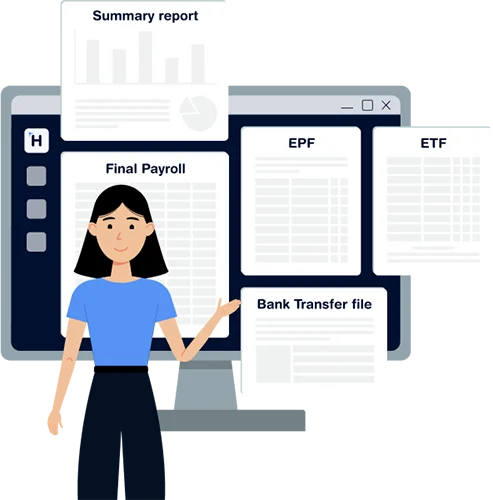For many small and medium-sized businesses in Sri Lanka, tax time can feel like a scramble. Whether it’s preparing EPF/ETF filings, generating the T10 or the Annual Statement of Employer, or keeping payroll documentation in order for audits, the process often becomes stressful and time-consuming, especially when records are scattered across spreadsheets, printed forms, or incomplete files.
This is where digital HR reports make all the difference. A modern HRIS system not only simplifies day-to-day employee and payroll management but also equips SMEs with the reporting power they need to stay compliant with Sri Lankan labour laws and tax regulations.
Why Compliance Matters for SMEs
SMEs may be small in size, but they are not exempt from regulatory responsibilities. Whether you employ five or 50 staff members, you are expected to maintain proper records, submit mandatory returns, and pay government contributions on time. Failing to comply can result in fines, legal complications, or damaged trust with employees and partners.
Common Compliance Obligations for SMEs
In Sri Lanka, some of the most common HR-related compliance requirements for employers include:
- EPF/ETF contributions: Statutory deductions made monthly
- APIT deductions: Pay-as-you-earn income tax, deducted based on salary thresholds
- T10: Certificate of income tax deductions provided to employees annually
- Annual Statement of Employer: A yearly summary submitted to the Inland Revenue Department
- Payroll records: Maintained for audits and reporting, showing gross pay, deductions, benefits, and net pay
- Leave and attendance records: Needed for wage disputes, audits, and labour inspections
Manual methods make it easy to miss steps or overlook updates in tax rates. A digital system, on the other hand, reduces the chance of errors while ensuring you’re always working with the latest requirements.
How Digital HR Reports Support Compliance Readiness
Here’s how an HRIS with built-in reporting features can help Sri Lankan SMEs stay ready year-round:
1. Centralised and Real-Time Recordkeeping
A cloud-based HR system keeps employee information, salary details, attendance, leave balances, and deductions in one place. Reports can be generated instantly, ensuring you’re never caught off guard during an audit or compliance check.
2. Automated Generation of Statutory Reports
Many modern HRIS platforms generate APIT, EPF, and ETF contribution summaries automatically. You can also generate employee T10 reports and the Annual Statement of Employer directly from the system, reducing the time and risk of manual preparation.
3. Timely Access to Updated Tax Tables
When tax rules change, such as APIT brackets or contribution limits, your HRIS system reflects these updates immediately (if properly maintained). This ensures deductions are always calculated correctly without the need for manual adjustments.
4. Exportable Reports for Submission
Digital HR reports can be downloaded in formats accepted by auditors or regulatory bodies such as Excel or PDF, making it easy to attach them to online filings or send them to tax consultants without rework.
5. Improved Accuracy and Reduced Human Error
Automated calculations for payroll, overtime, no-pay, and statutory deductions significantly lower the chance of errors. This leads to more accurate tax filings and fewer disputes with employees or authorities.
Building Long-Term Compliance Habits
Instead of seeing compliance as a once-a-year burden, SMEs can use digital HR reports to build a proactive compliance culture. By reviewing key reports monthly such as payroll summaries, leave and attendance records, and employee registers, business owners can detect and fix issues early, rather than during crunch time.
This also supports better decision-making. For example, reviewing employee tax deductions regularly can help identify if someone’s income has crossed a new tax threshold, allowing the company to adjust APIT deductions accordingly.
Staying Prepared, Stress-Free
Tax and labour compliance does not need to be stressful, especially for SMEs already balancing tight resources. With a digital HR system in place, Sri Lankan businesses can simplify the process, maintain transparency, and reduce the risk of penalties.
By leveraging HR reports for real-time insight and reliable documentation, compliance becomes less about panic and more about preparation. And for a growing SME, that peace of mind is worth its weight in gold.



